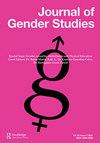Speak-out movements from the margins: an intersectional and spatial analysis of sexual violence in India
IF 1.5
3区 社会学
Q2 SOCIAL ISSUES
引用次数: 0
Abstract
This article details the politics of scale manifest in Dignity March, a grassroots speak-out movement against sexual violence that occurred at the same time as the #MeToo movement in India but was not part of the mainstream discourse. The spatial concept of scales explains the production of different spaces and their mutually constitutive nature. Building on the concept, scales are used here as an analytical framework to explain the intersectional and spatial nature of sexual oppression and resistance. Based on ethnographic research and in-depth interviews of sexual violence survivors from mainly oppressed-caste communities in rural India, this article demonstrates how speak-out movements help build communities of resistance. These forged communities, imbued with an understanding of intersectional, lived experience from the margins, create spaces of radical openness across multiple scales, be it at the level of the body, community, or regional/national. This article explores the many abolitionist practices of transformative justice__ a mode of justice that addresses the systems that produce impunity and margin- alisation__ that become possible in spaces of radical openness. It argues for reimagining transnational solidarities in the fight against sexual vio- lence and rooting it in an understanding of resistance movements in the margins of the geo-political South.从边缘发声运动:对印度性暴力的交叉和空间分析
这篇文章详述了尊严游行中体现的规模政治,尊严游行是一场反对性暴力的草根运动,与印度的#MeToo运动同时发生,但并未成为主流话语的一部分。尺度的空间概念解释了不同空间的产生及其相互构成的本质。在这个概念的基础上,尺度被用作分析框架来解释性压迫和性抵抗的交叉性和空间性。基于民族志研究和对来自印度农村主要受压迫种姓社区的性暴力幸存者的深入访谈,本文展示了直言不讳的运动如何帮助建立抵抗社区。这些锻造的社区,充满了对交叉的理解,来自边缘的生活经验,在多个尺度上创造了激进的开放空间,无论是在身体、社区还是地区/国家的层面上。本文探讨了变革司法的许多废除主义实践——这是一种司法模式,解决了在激进开放的空间中可能产生有罪不罚和边缘化的制度。它主张在反对性暴力的斗争中重新设想跨国团结,并将其植根于对地缘政治南方边缘抵抗运动的理解。
本文章由计算机程序翻译,如有差异,请以英文原文为准。
求助全文
约1分钟内获得全文
求助全文
来源期刊

Journal of Gender Studies
Multiple-
CiteScore
4.40
自引率
0.00%
发文量
52
期刊介绍:
The Journal of Gender Studies is an interdisciplinary journal which publishes articles relating to gender from a feminist perspective covering a wide range of subject areas including the Social and Natural Sciences, Arts and Popular Culture. Reviews of books and details of forthcoming conferences are also included. The Journal of Gender Studies seeks articles from international sources and aims to take account of a diversity of cultural backgrounds and differences in sexual orientation. It encourages contributions which focus on the experiences of both women and men and welcomes articles, written from a feminist perspective, relating to femininity and masculinity and to the social constructions of relationships between men and women.
 求助内容:
求助内容: 应助结果提醒方式:
应助结果提醒方式:


